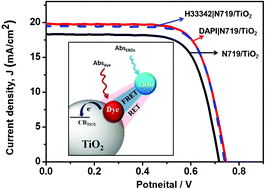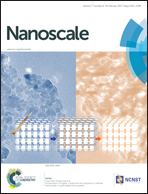Novel energy relay dyes for high efficiency dye-sensitized solar cells†
Abstract
4′,6-Diamidino-2-phenylindole (DAPI) and Hoechst 33342 (H33342) were used as novel energy relay dyes (ERDs) for an efficient energy transfer to the N719 dye in I−/I3− based liquid-junction dye-sensitized solar cells (DSSCs). The introduction of the ERDs, either as an additive in the electrolyte or as a co-adsorbent, greatly enhanced the power conversion efficiencies (PCEs), mainly because of an increase in short-circuit current density (Jsc). This was attributed to the effects of non-radiative Förster-type excitation energy transfer as well as the radiative (emission)-type fluorescent energy transfer to the sensitizers. The net PCEs for the N719-sensitized DSSCs with DAPI and H33342 were 10.65% and 10.57%, and showed an improvement of 12.2% and 11.4% over control devices, respectively.


 Please wait while we load your content...
Please wait while we load your content...